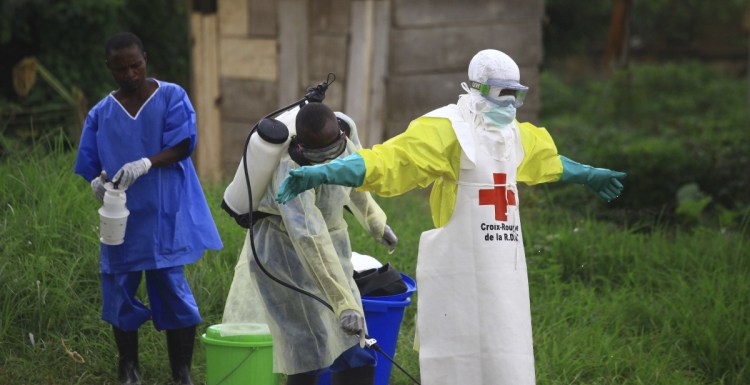BENI, Congo — A runaway hearse carrying an Ebola victim has become the latest example of sometimes violent community resistance complicating efforts to contain a Congo outbreak – and causing a worrying new rise in cases.
The deadly virus’ appearance for the first time in the far northeast has sparked fear. Suspected contacts of infected people have tried to slip away. Residents have assaulted health teams. The rate of new Ebola cases has more than doubled since the start of this month, experts say.
Safe burials are particularly sensitive as some outraged family members reject the intervention of health workers in the deeply personal moment, even as they put their own lives at risk.
On Wednesday, a wary peace was negotiated over the body of an Ebola victim, one of 95 deaths among 170 confirmed cases so far, Congo’s health ministry said. Her family demanded that an acquaintance drive the hearse, while they agreed to wear protective gear to carry the casket. On the way to the cemetery, however, the hearse peeled away “at full speed,” the ministry said. A violent confrontation followed with local youth once the hearse was found at the family’s own burial plot elsewhere.
The Beni community, where the confrontation occurred, is at the center of Ebola containment efforts. To the alarm of the World Health Organization and others, it is also where community resistance has been the most persistent.
So far, the Ebola work in Beni has been suspended twice since the outbreak was declared on Aug. 1.
Defending themselves, Beni residents have pointed out the shock of having one of the world’s most notorious diseases appear along with strangers in biohazard suits who tell them how to handle the dead.
“Until now we didn’t know enough about Ebola and we felt marginalized when Red Cross agents came in and took the corpse and buried it without family members playing a role,” Beni resident Patrick Kyana told The Associated Press. “It’s very difficult. Imagine that your son dies and someone refuses to let you assist in his burial. In Africa we respect death greatly.”
Until recently many people in Beni didn’t believe that Ebola existed, thinking it was a government plot to further delay presidential elections, said Kizito Hangi, president of Beni’s civil society.
Now the population has started to catch on and cooperate, Hangi said. “The problem was that the health workers all came from outside, but local specialists have been included to persuade and inform people in local languages.”
Send questions/comments to the editors.



Success. Please wait for the page to reload. If the page does not reload within 5 seconds, please refresh the page.
Enter your email and password to access comments.
Hi, to comment on stories you must . This profile is in addition to your subscription and website login.
Already have a commenting profile? .
Invalid username/password.
Please check your email to confirm and complete your registration.
Only subscribers are eligible to post comments. Please subscribe or login first for digital access. Here’s why.
Use the form below to reset your password. When you've submitted your account email, we will send an email with a reset code.